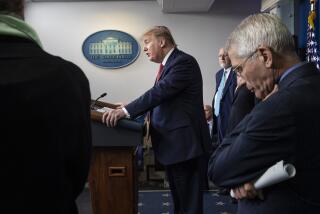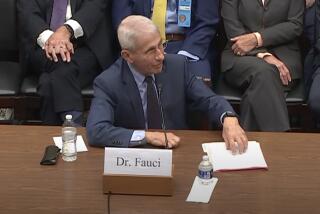Delegates Assail Sakharov Over Atrocity Charge
- Share via
MOSCOW — Andrei D. Sakharov, the Soviet nuclear physicist who won the 1975 Nobel Peace Prize for his human rights campaigns, was shouted down in the Soviet Union’s new assembly Friday as he tried to repeat charges that Moscow’s troops had committed atrocities during the long war in Afghanistan.
Sakharov, who denounced the nine-year war as a “criminal adventure,” was attempting to reply to a Soviet veteran of the Afghan war who had angrily denied Sakharov’s charges. But other members of the Congress of People’s Deputies began to jeer Sakharov and prevented him from finishing.
“The essence and aims of the irresponsible accusations by Deputy Sakharov are far from clear,” veteran Sergei Chervonopissky, who lost both of his legs in the war, had told the congress, denouncing Sakharov for comments made to a Canadian newspaper earlier this year. “We are outraged by his irresponsible and provocative assertions.”
Chervonopissky’s speech brought virtually all the 2,250 deputies, including the Communist Party’s top leadership, to their feet in several minutes of emotional and sustained applause. Then Sakharov came to the podium to defend himself.
As other deputies shouted their disapproval and began clapping their hands and stomping their feet in protest, Sakharov recalled how he had been exiled from Moscow and forced to live for six years in the industrial city of Gorky.
“We have to cleanse ourselves of this terrible shame,” said Sakharov, who was clearly shaken by the angry response he drew. “I spoke out against sending Soviet soldiers to Afghanistan, and for this I was exiled to Gorky. I am proud of that exile, and I wear it like a medal today.”
Not a single deputy came to Sakharov’s defense as the jeers drove him from the podium in the Kremlin’s Palace of Congresses where the deputies have been meeting for the past 10 days.
“He has opened a very deep wound in our society, a wound that will take a long time to heal, and his statements are the same as pouring salt into it,” said Roy A. Medvedev, a leading Soviet historian who, like Sakharov, was a political dissident for many years before his election to the congress.
“I did not defend him because it was not possible to defend him. His statement was irresponsible or perhaps naive,” Medvedev said. “He is right about that war, but he does not understand the conflicting emotions that people feel about it.”
‘Crimes of the Soviet Army’
Sakharov, 68, told reporters later that his “only regret” was that he had not mentioned “all the crimes of the Soviet army in Afghanistan--the napalm, the bombing of schools, hospitals and entire regions.”
Sergei Stankevich, a member of the radical “Moscow Group” of deputies, commented afterward, “This was the moral lynching of a remarkable man. The war was a mistake, it was our national shame.”
The furor arose when Chervonopissky, a deputy elected by the Communist Youth League, called for the country to honor the Soviet soldiers who served in Afghanistan and denounced Sakharov for allegations he had made while touring Canada that Soviet helicopter pilots had orders to kill any soldiers they could not rescue from probable capture by the moujahedeen, the Muslim rebels fighting Afghanistan’s government.
The Soviet Union sent troops to Afghanistan in December, 1979, to support the Marxist government, and did not withdraw until last February.
“On behalf of the soldiers, I say this is not true,” Chervonopissky declared.
Sakharov, who has spoken several times to the congress but with diminishing effect, tried to defend himself, saying that he had been recounting the allegations of others as evidence of the brutality of the war and had called for an investigation into the accusations.
“I deeply respect the Soviet army and Soviet soldiers,” he told the congress, struggling to make himself heard over the shouts of the deputies. “I never insulted the heroic Soviet soldiers who served there, but the war itself was a criminal adventure and a huge crime by our country that cost the lives of almost 1 million Afghans. It was a war of annihilation, a terrible sin.”
Sakharov said that the alleged orders to the pilots to kill soldiers threatened with capture was still under investigation--and that he was gathering evidence to support it.
“Until that investigation is complete,” he said, “no one has the right to call me a liar.”
But Marshal Sergei F. Akhromeyev, former armed forces chief of staff and now an adviser to President Mikhail S. Gorbachev, said that the charges were “a blatant lie.”
‘No Such Instruction’
“Neither the General Staff nor the Defense Ministry have issued any order of the kind alleged by Academician Sakharov,” Akhromeyev said. “We have not received any such instruction from our country’s political leadership.
“All this is a lie, and Academician Sakharov will not be able to find any documents to confirm his lie,” Akhromeyev added, using Sakharov’s title as a member of the Soviet Academy of Sciences.
Half a dozen other deputies also denounced Sakharov in one of the most tumultuous moments in a session that has been marked by heated debates and strong emotions.
“With just one step you have canceled all your previous activities,” Tursun Kazakova from Tashkent in Uzbekistan told Sakharov. “You have insulted our entire army, our entire nation, all of our boys who gave their lives. I express our common disgust to you.”
More to Read
Sign up for Essential California
The most important California stories and recommendations in your inbox every morning.
You may occasionally receive promotional content from the Los Angeles Times.













